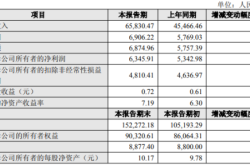MSI Titan GE78HX AI+ Ryzen Edition 2025 Laptop Review: Sleek and Potent, Flagship Performance for Effortless 2K Gaming
![]() 08/21 2025
08/21 2025
![]() 634
634
I. Introduction: RTX 50 Series Powers the New Large-Screen All-Rounder
NVIDIA's RTX 50 series GPUs, along with the latest DLSS 4 technology, have revolutionized gaming performance. This AI-driven feature inserts up to three additional frames per rendered frame, enabling mid-range GPUs to run high-quality games smoothly at 4K resolution. For gaming laptop users, DLSS 4 stands out as an invaluable asset, significantly boosting frame rates despite the form factor's inherent limitations in performance and power consumption.
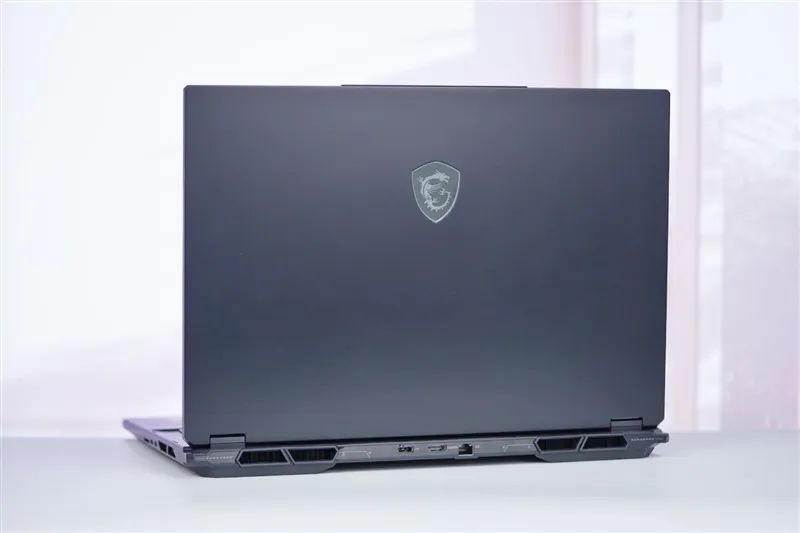
MSI's latest flagship, the Titan GE78HX AI+ series, harnesses the RTX 50 series GPU to deliver unparalleled mobile gaming experiences. By leveraging DLSS 4, this series achieves superior frame rates with reduced power consumption and heat generation.
We have the MSI Titan GE78HX AI+ Ryzen Edition 2025 (hereinafter referred to as MSI Titan GE78HX Ryzen Edition) in our Fast Technology Review Lab, ready for an in-depth look.
The 2025 models of the MSI Titan GE78HX and Titan GE76 offer versatile configurations. Processor options include AMD's Ryzen AI 9 HX 370 or Intel's Core Ultra 9 275HX/285H, paired with NVIDIA RTX 5070, RTX 5070 Ti, RTX 5080, or RTX 5090 Laptop GPUs.
Our review unit is equipped with an AMD Ryzen AI 9 HX 370 CPU and RTX 5070 Ti Laptop GPU. Let's dive into its performance, particularly with DLSS 4 technology.
Beyond its robust CPU and GPU, the MSI Titan GE78HX Ryzen Edition boasts an 18-inch flagship-level display with a 16:10 aspect ratio, 2560x1600 resolution, 240Hz refresh rate, 100% DCI-P3 color gamut coverage, and 500 nits of brightness, rivaling professional gaming monitors.
Dynaudio, a top Danish audio brand, provides the six-channel speakers, which have undergone professional tuning and achieved Hi-Res certification for an immersive audio experience.
The SteelSeries per-key RGB backlit keyboard with transparent keycaps for WASD and the power button rivals professional gaming peripherals.
Its 99.9Wh internal battery, the maximum capacity allowed for carry-on luggage, supports ultra-fast charging, providing 50% charge in just 30 minutes.
Detailed specifications of the MSI Titan GE78HX Ryzen Edition are as follows:
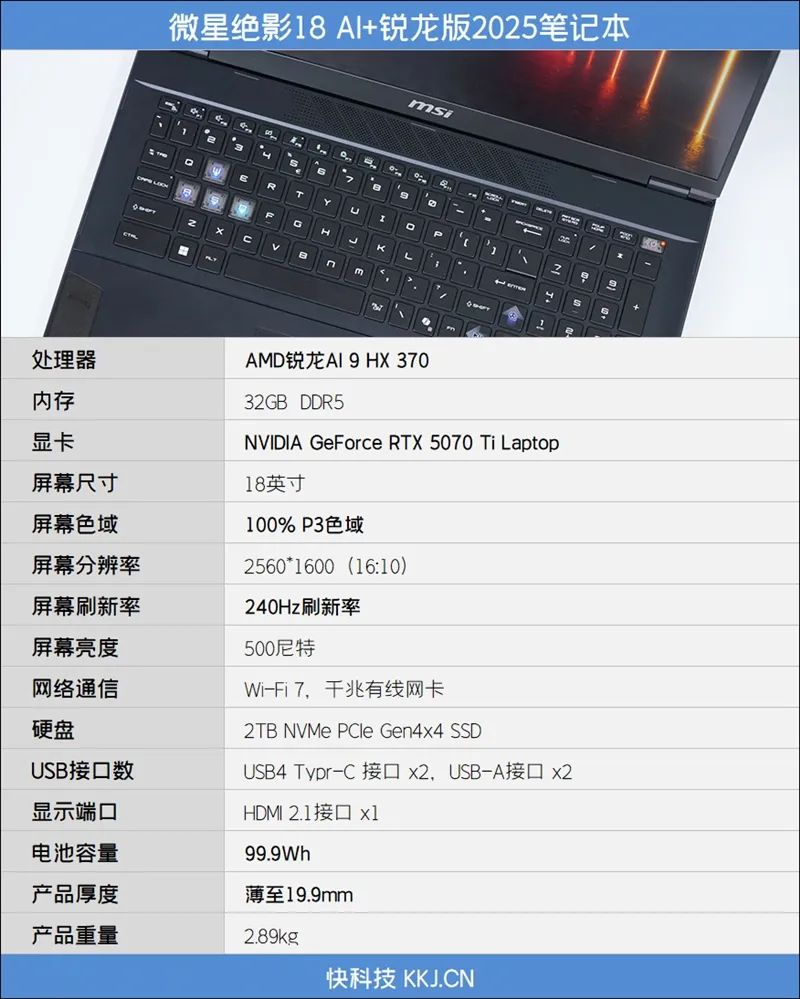
II. Aesthetic Appraisal: An 18-inch Masterpiece with Refined Craftsmanship and Advanced Cooling
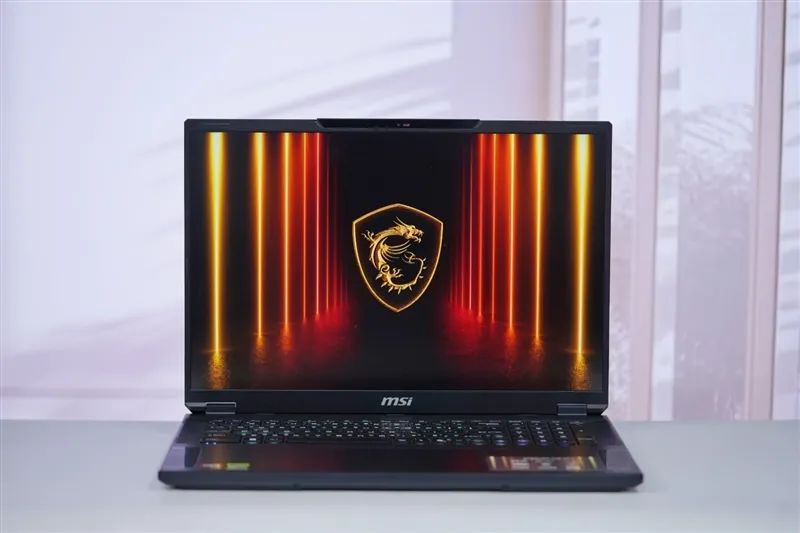
The MSI Titan GE78HX Ryzen Edition sports a sleek dark design, exuding elegance and solidity.
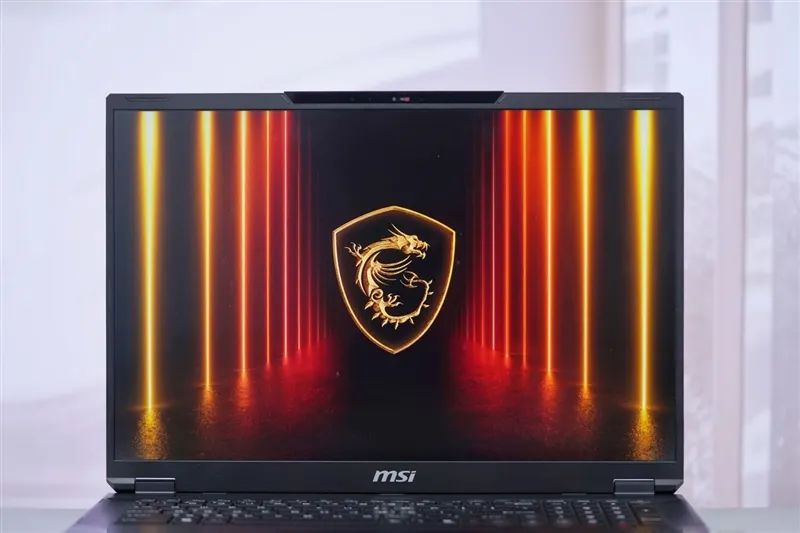
The narrow-bezel screen design is complemented by an elevated camera area at the top, with the MSI logo centrally placed below the screen.

A physical privacy shutter protects the camera, ensuring privacy security.
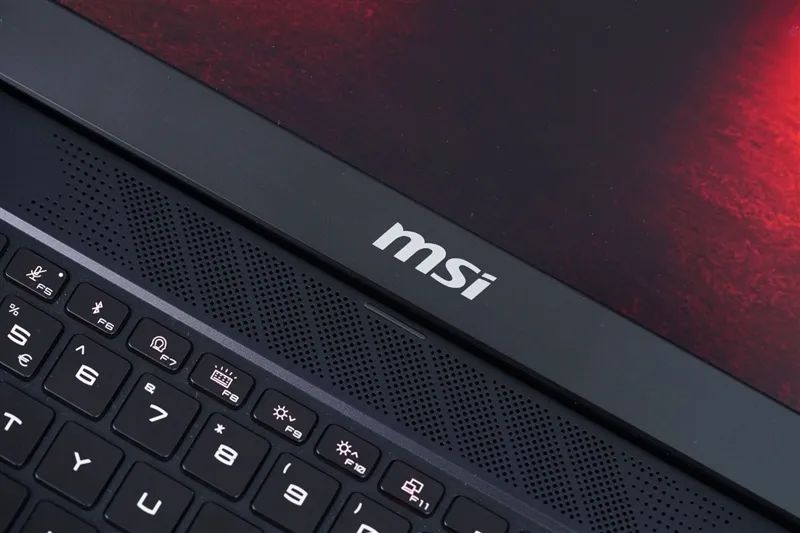
A close-up of the MSI logo beneath the screen.
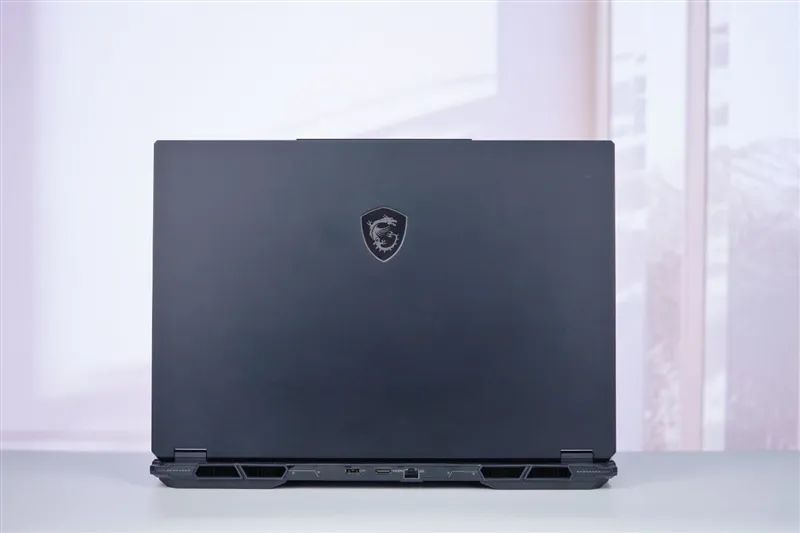
The lid design is minimalist, featuring only the MSI shield-shaped dragon logo.
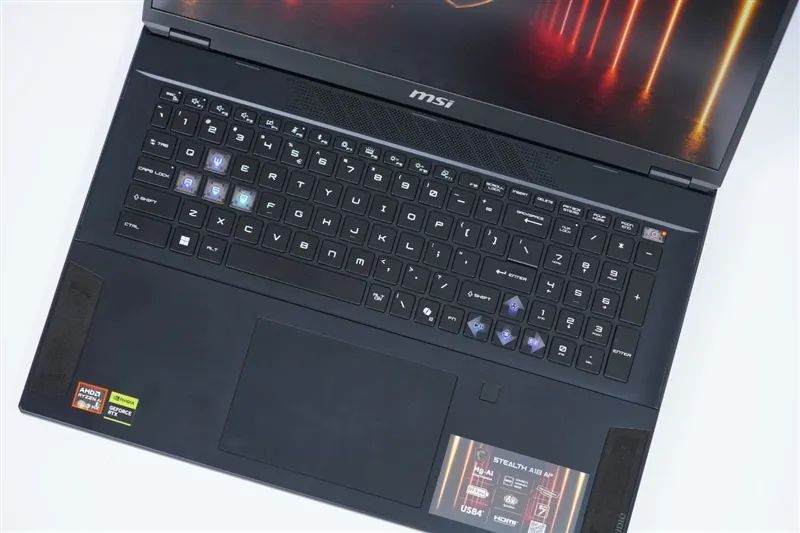
The keyboard stands out with transparent keycaps for WASD and the power button, along with eye-catching translucent patterns on the full-height arrow keys.
The spacious touchpad is centrally located, with an independent fingerprint sensor on the right side for enhanced data security.
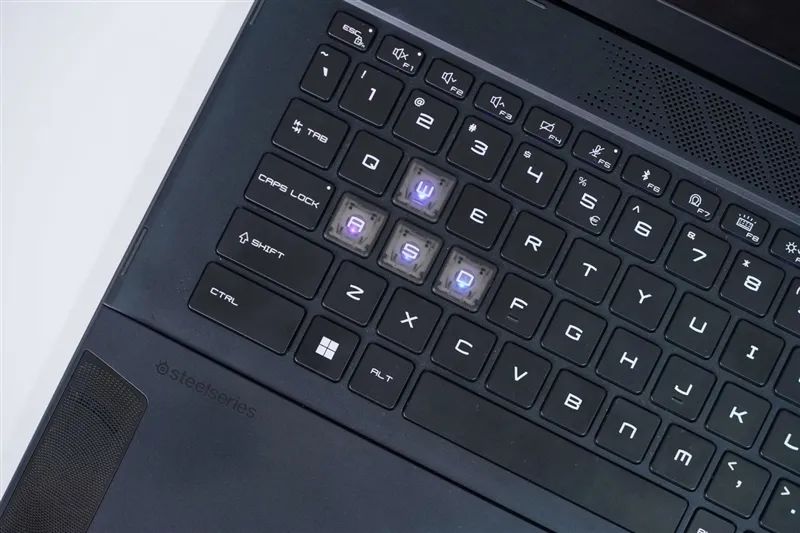
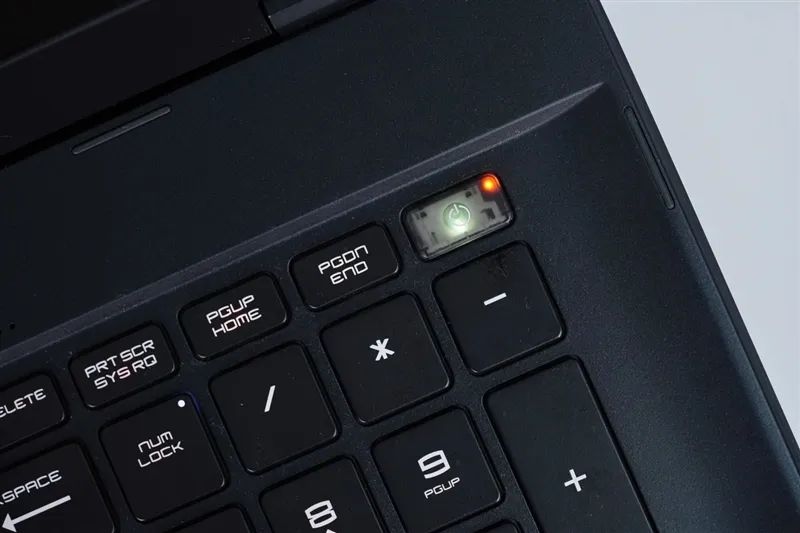
Close-ups of the unique transparent keycaps.
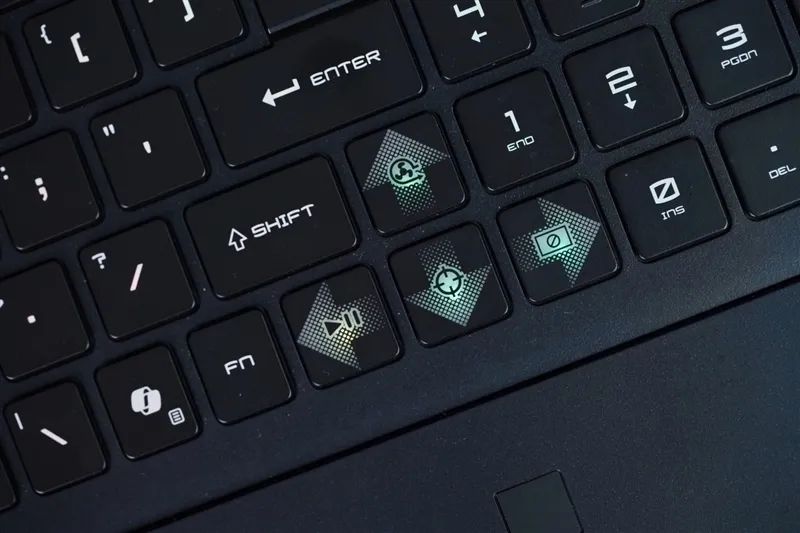
Close-up of the arrow keys.
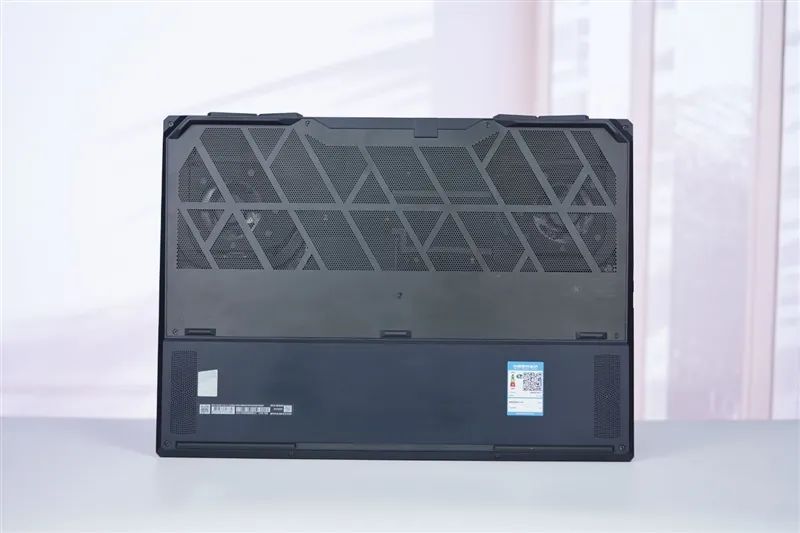
The bottom is equally simple, with a large ventilation area revealing the dual internal cooling fans and heat pipes.

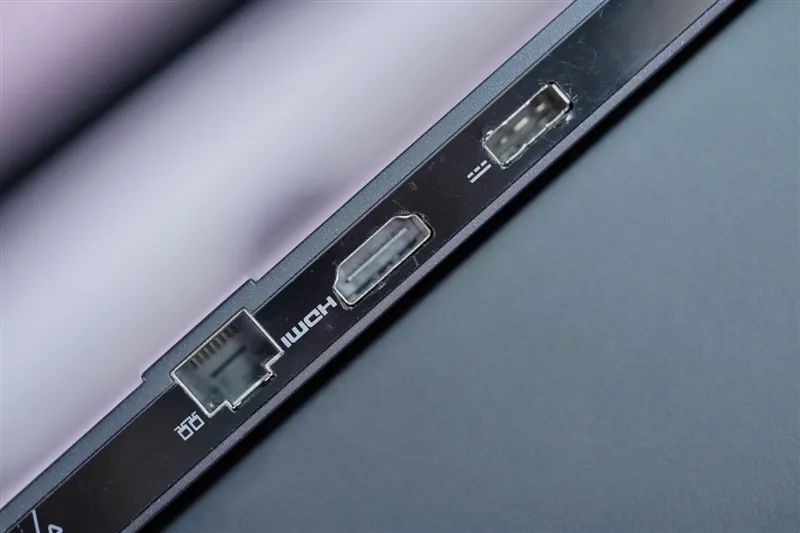
The rear hosts three ports: a 2.5GbE Ethernet port, an HDMI 2.1 port supporting up to 4K120Hz or 8K60Hz, and a rectangular power port.
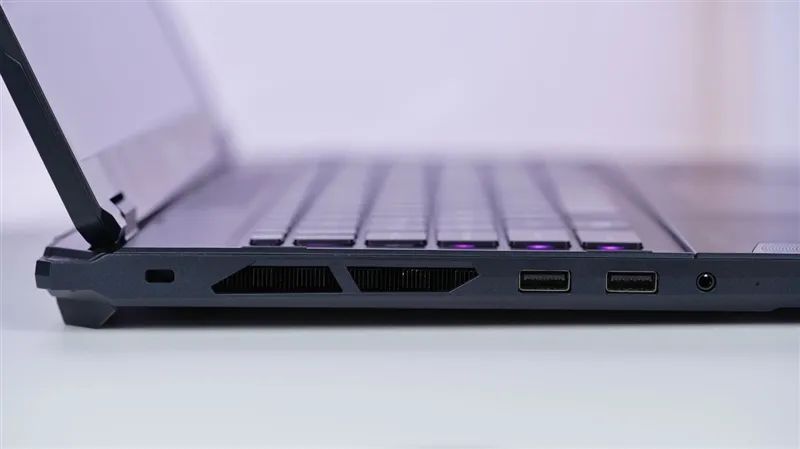
The left side features two USB 3.2 Gen2 Type-A ports and a combo audio jack, along with a security lock slot near the hinge.
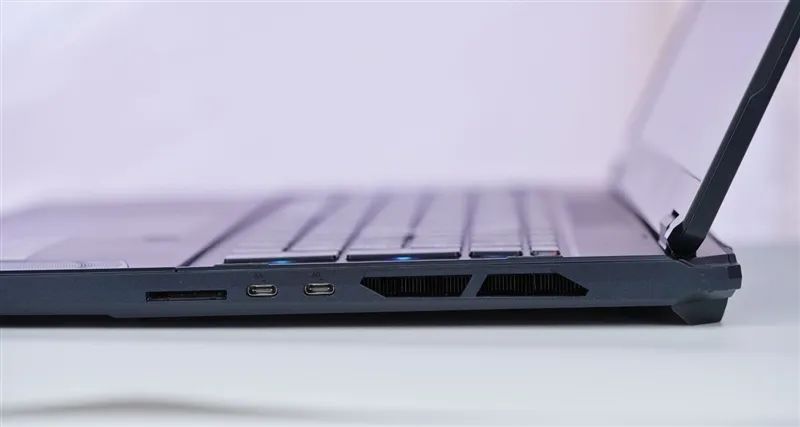
The right side includes an SD Express card reader and two USB4 ports supporting DisplayPort video output and PD3.1 charging, compatible with Thunderbolt 4.
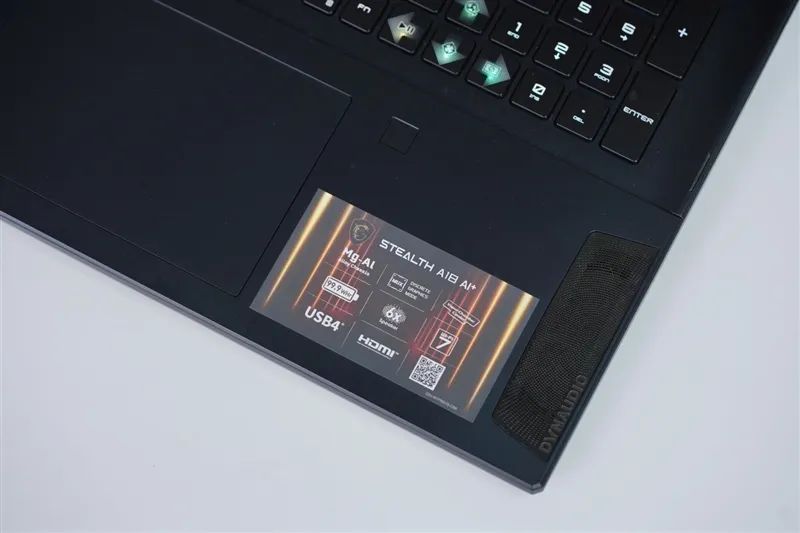
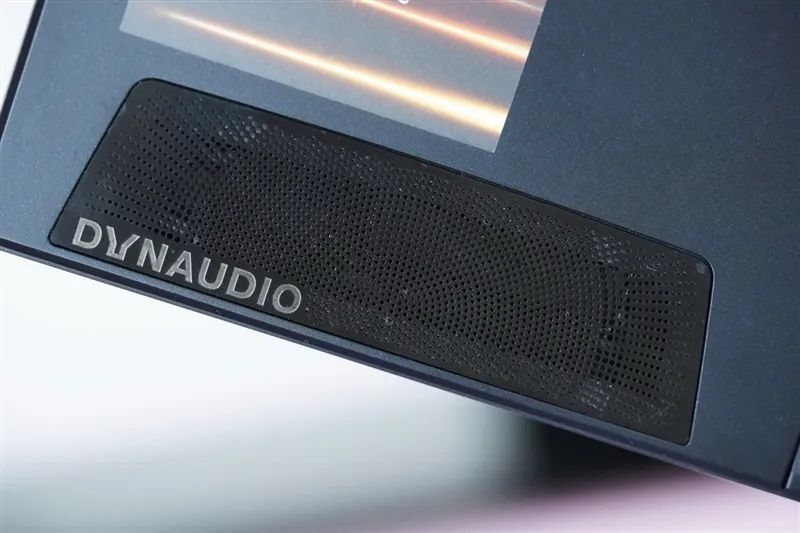
Dynaudio speakers grace the wrist rest edges, with an electroplated grille and 6-channel audio system delivering an exceptional audiovisual experience.
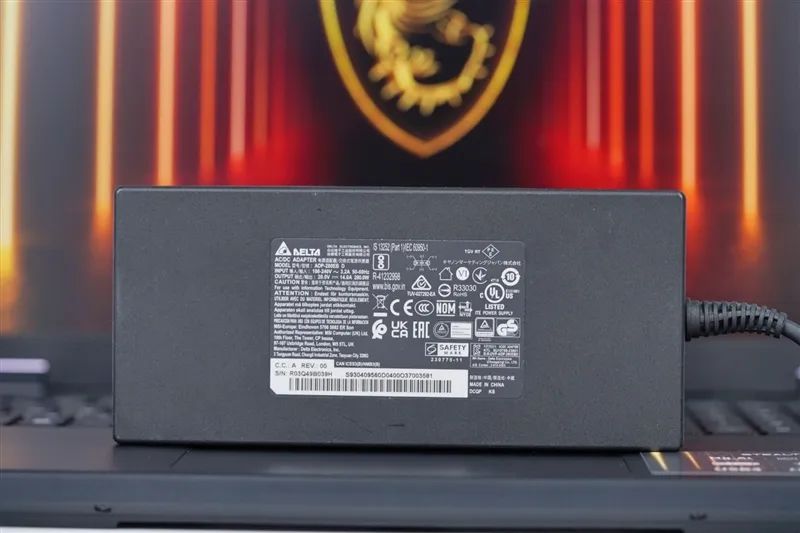
The 280W charger included with the MSI Titan GE78HX Ryzen Edition.
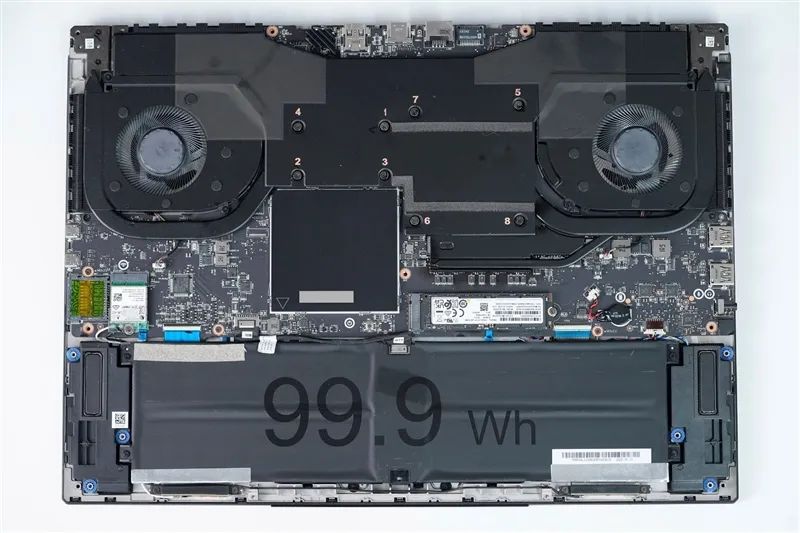
Removing the bottom cover reveals the internal layout, with the motherboard at the top and the battery occupying about one-third of the lower section.
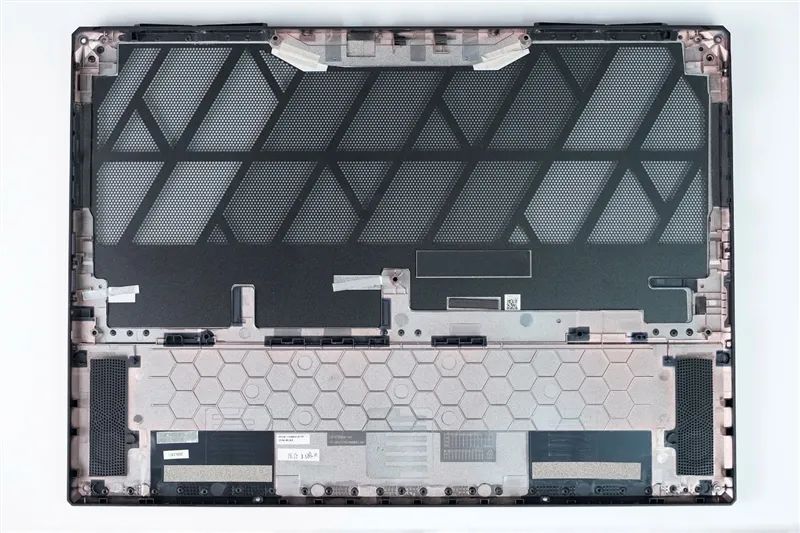
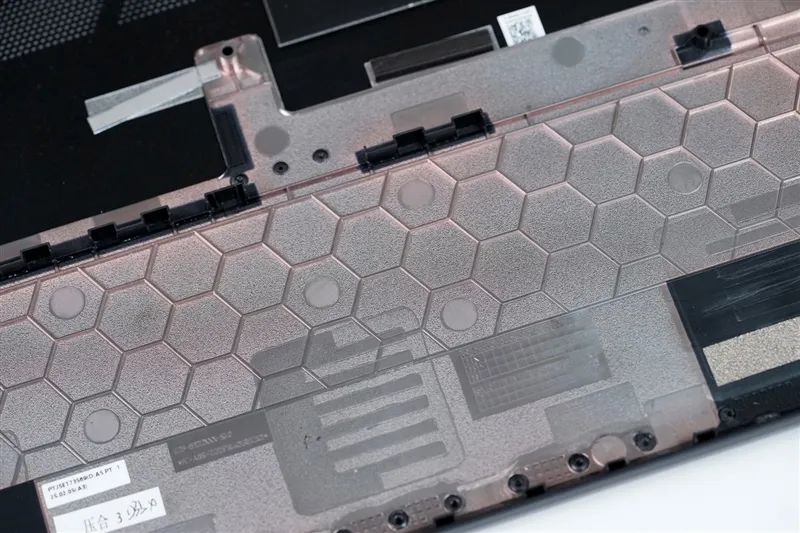
The bottom cover features large air inlets and hexagonal reinforcing ribs for robust cooling.
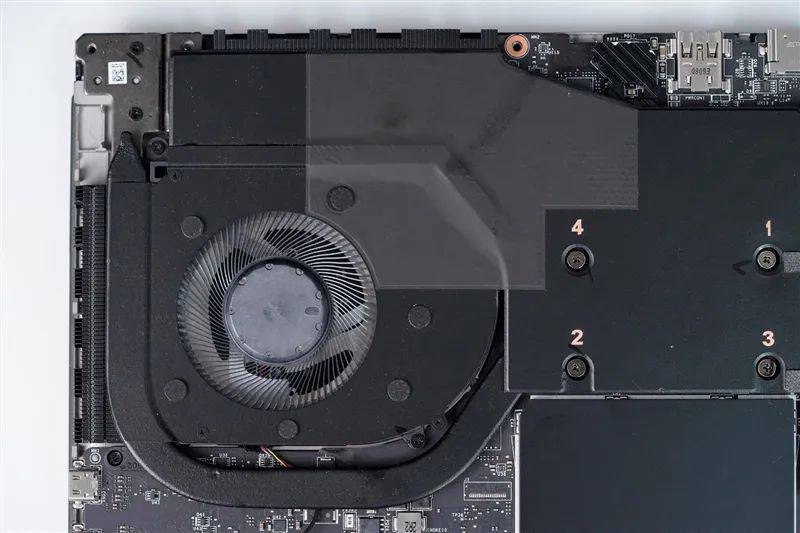
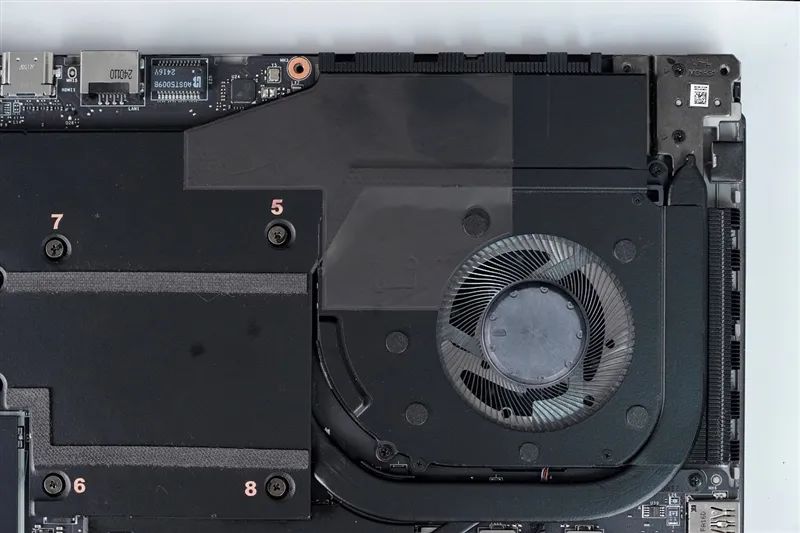
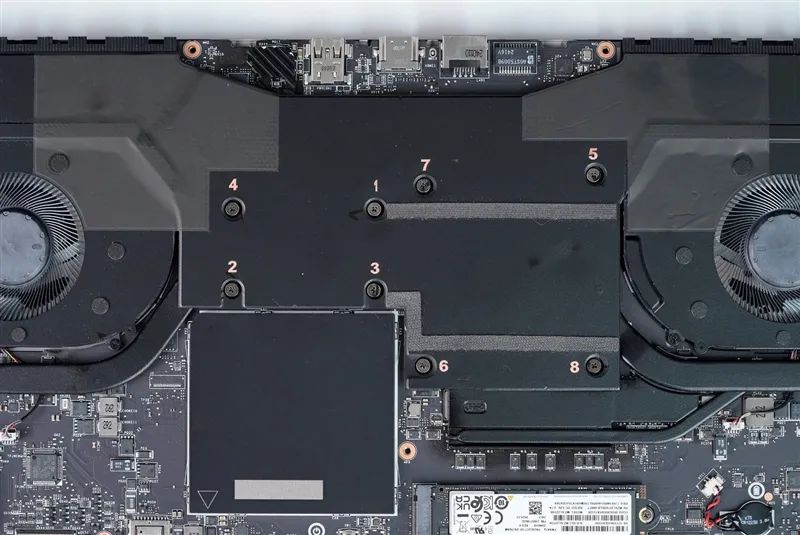
The advanced cooling system includes a large vacuum chamber vapor chamber between the two Cooler Master fans, with additional rear, side, and center auxiliary air ducts for optimal cooling.
The central vacuum chamber is fixed with eight screws, possibly indicating assembly sequence. Diagonal locking might yield the best cooling, but further disassembly was avoided to preserve its effectiveness.
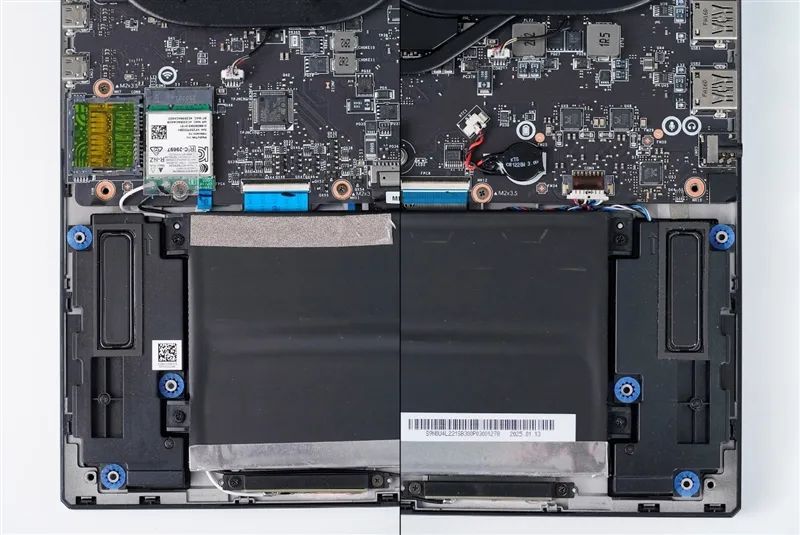
Large speaker units flank the battery, likely composite designs with low-frequency units facing downwards and mid-frequency units upwards.
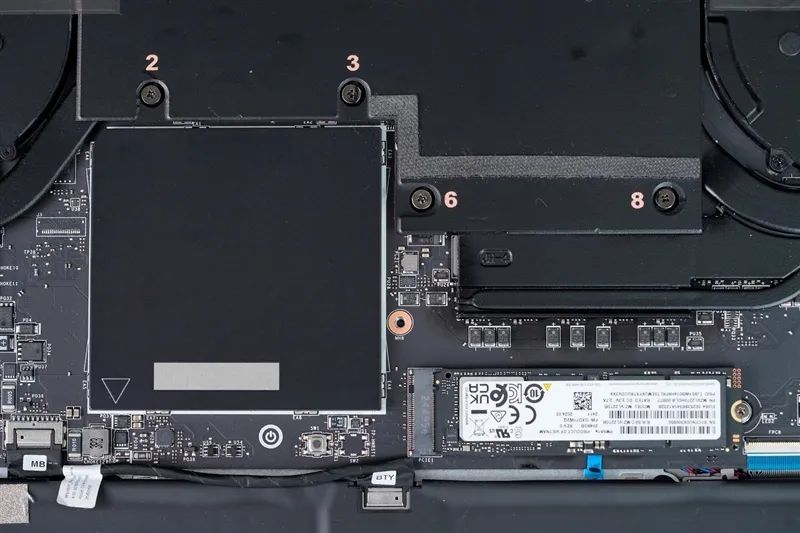
Memory and SSD are protected by metal shields and thermal stickers. A 2TB Samsung PM9A1a PCIe 4.0 SSD is pre-installed.
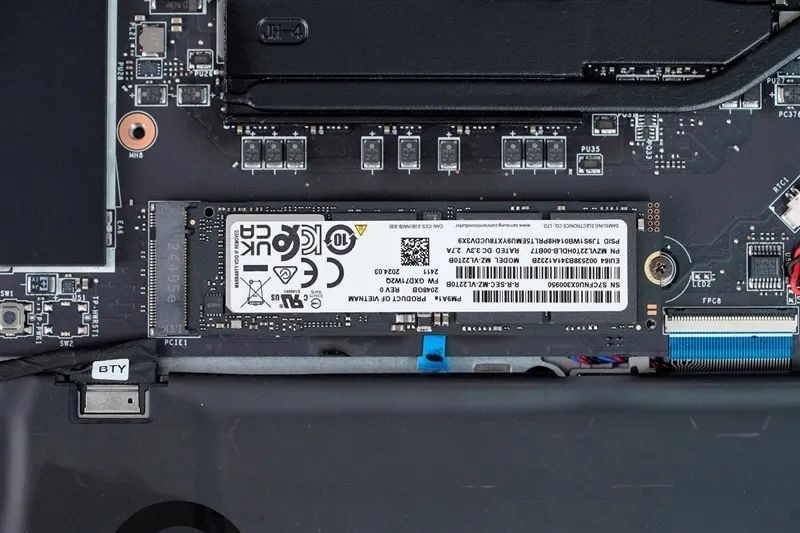
A close-up of the SSD. While no additional slot is available, the 2TB SSD should suffice for most users.
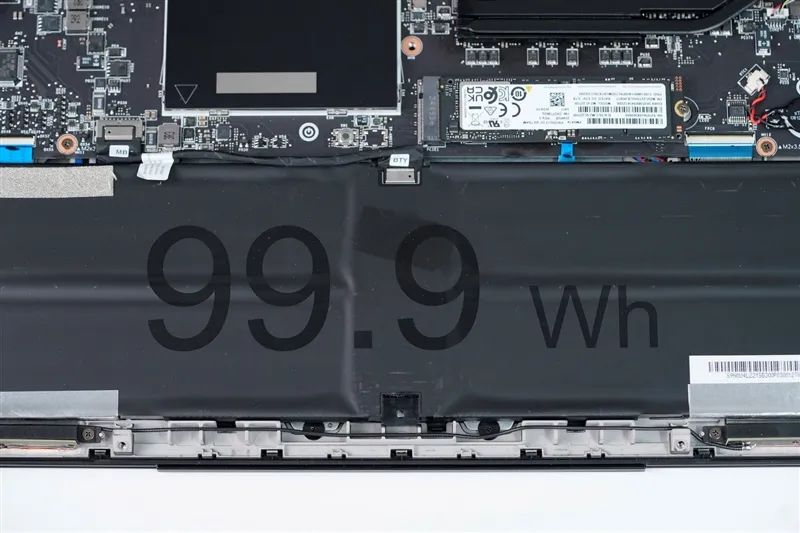
The 99.9Wh battery is the largest capacity allowed for carry-on luggage.
III. GPU Theoretical Performance Testing: RTX 5070 Ti Laptop Shows Consistent Improvements, DLSS 4 Shines
1. Speed Way
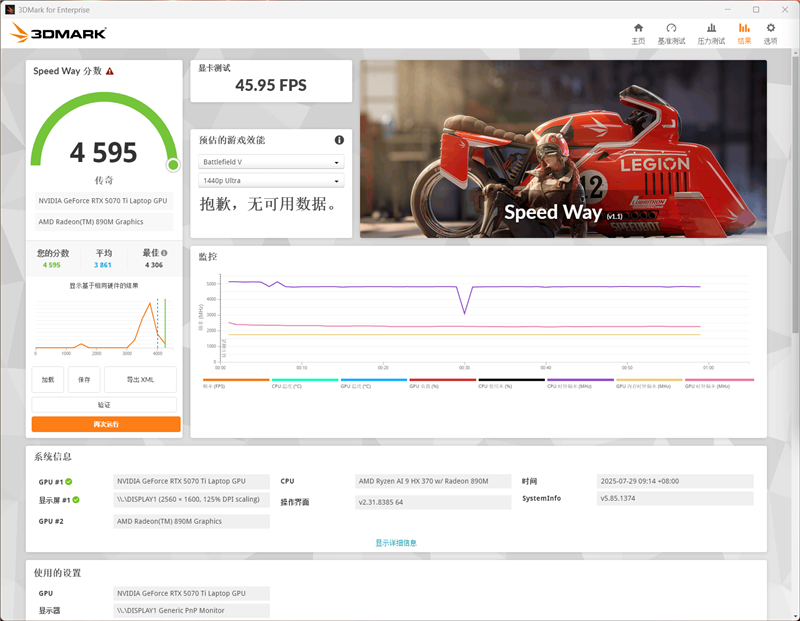
In 3DMark's Speed Way test, which assesses overall performance, the total score is 4595, with a GPU score of 45.95FPS.
2. Steel Nomad
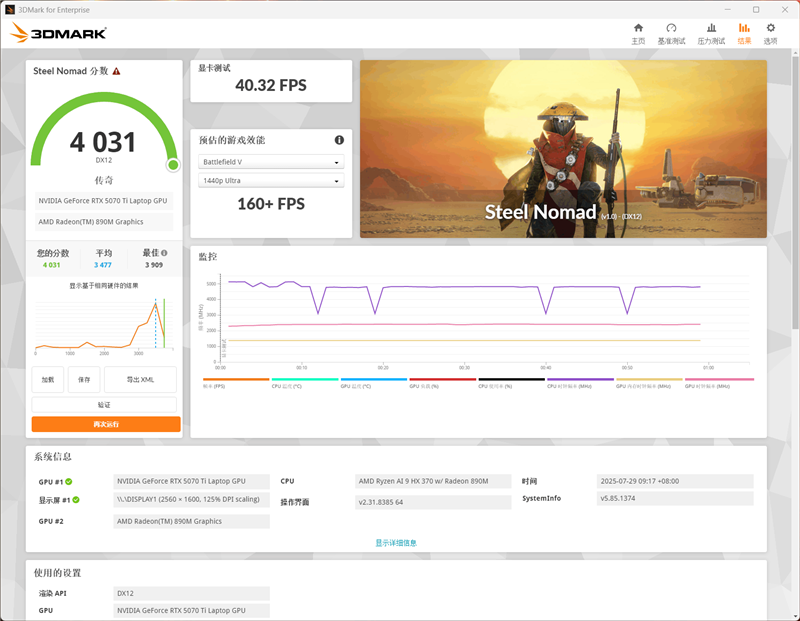
In 3DMark's Steel Nomad test, which evaluates reliability, stability, and sustained performance, the total score is 4031, with a GPU score of 40.31FPS.
3. Port Royal
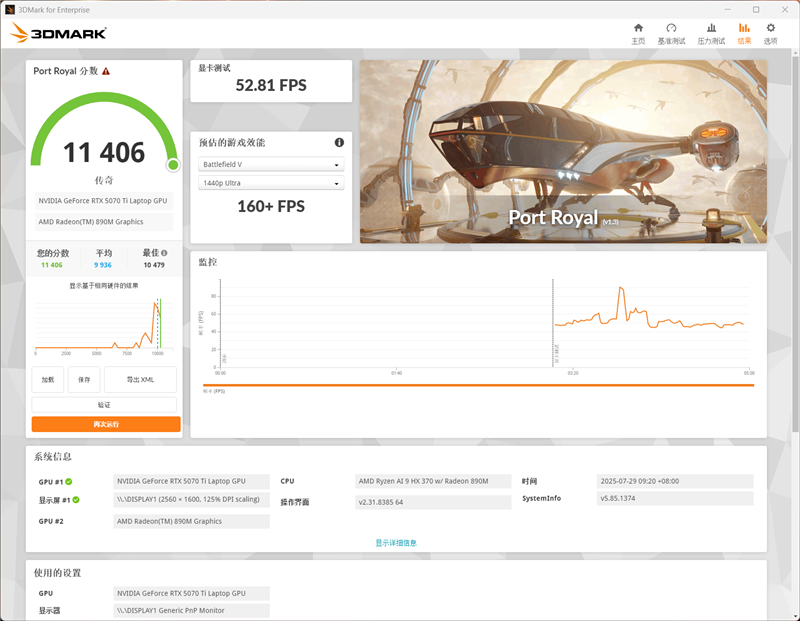
In 3DMark's Port Royal test for real-time ray tracing performance, the total score is 11406, with a GPU score of 52.81FPS.
4. Time Spy
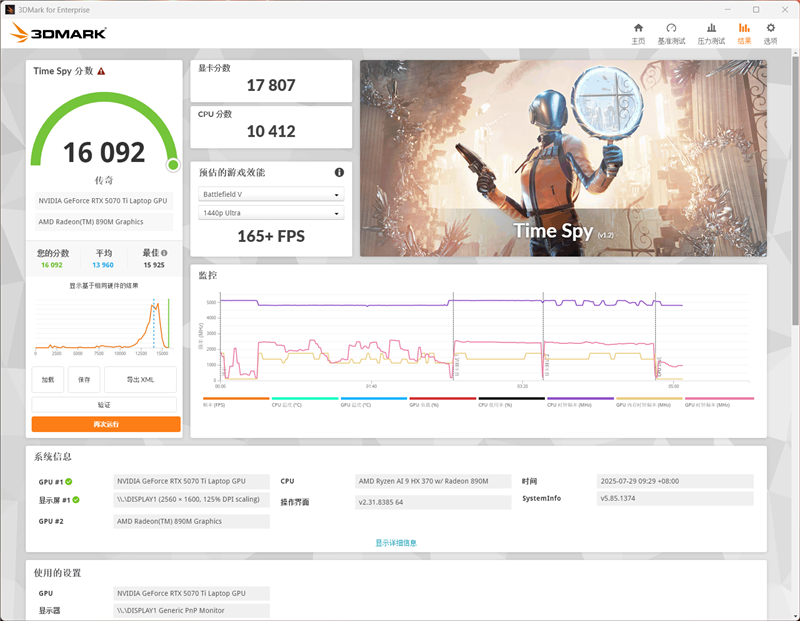
In 3DMark's Time Spy test (DX12 + 2K resolution), the total score is 16092, with a GPU score of 17807.
5. Time Spy Extreme
In Forza Horizon 5, using extreme graphics settings at 2K resolution, the final test result soared to 131 fps.
5. Gears 5
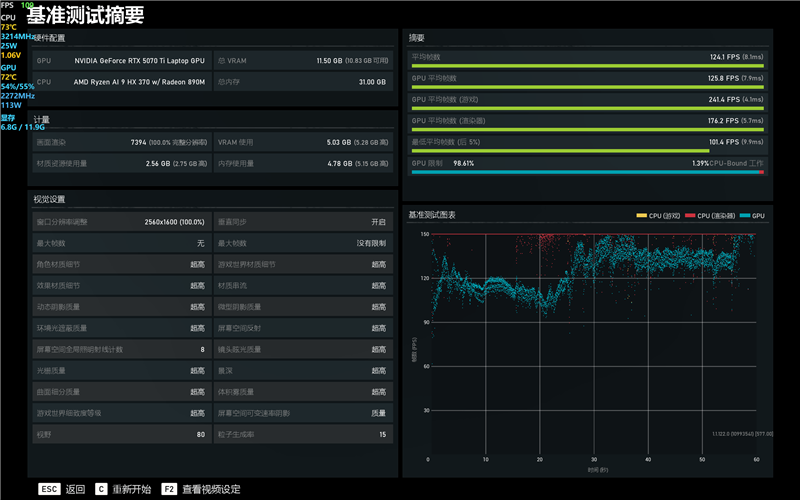
In Gears 5, with Ultra graphics settings at 2K resolution, the final test result stood at an impressive 124.1 FPS.
6. Horizon Zero Dawn
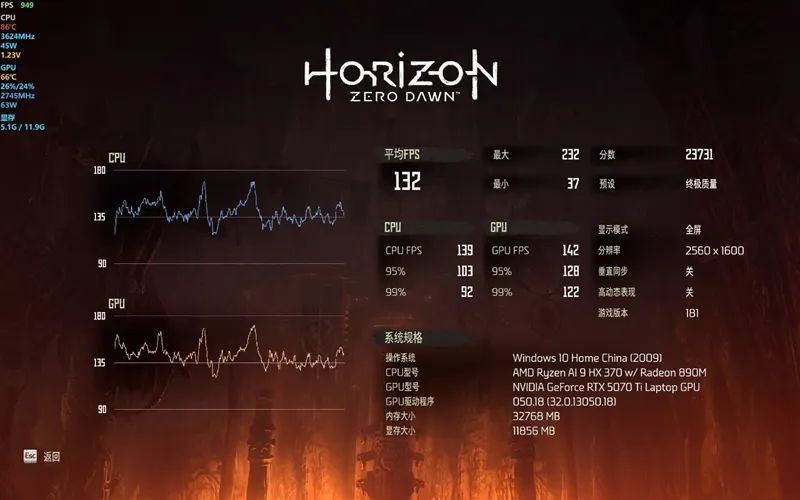
In Horizon Zero Dawn, using Ultimate Quality graphics settings at 2K resolution, the final test result was an outstanding 132 fps.
7. Tomb Raider: Shadow of the Tomb Raider
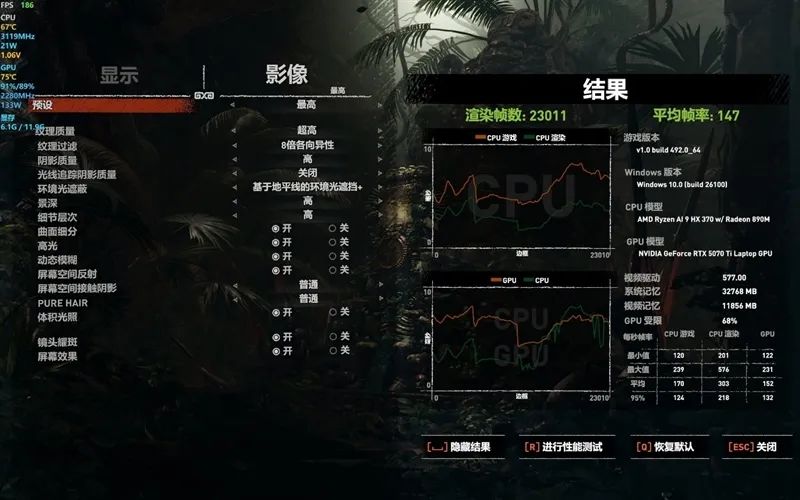
In Tomb Raider: Shadow of the Tomb Raider, using Maximum graphics settings at 2K resolution with DLSS super sampling set to Balanced, the average frame rate was a smooth 147 fps.
8. Monster Hunter: World

In Monster Hunter: World, with Very High graphics settings at 2K resolution and frame generation enabled, the final test result was an impressive 115.81 fps.
V. CPU Performance Testing: Zen 5 Architecture is Efficient and Energy-Saving
1. CPU-Z
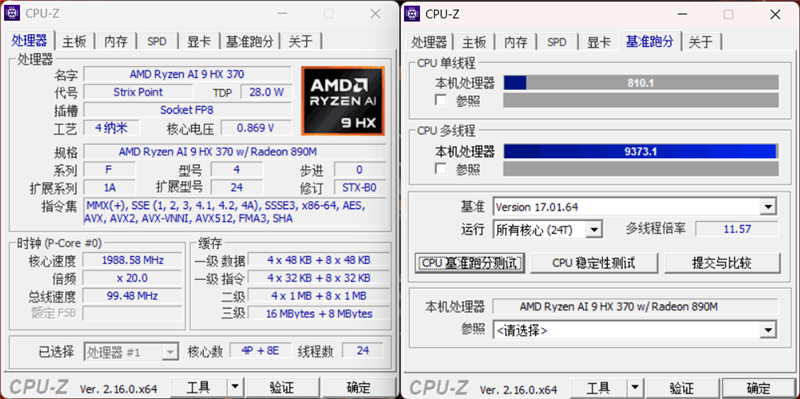
The AMD Ryzen AI 9 HX 370 processor in the MSI Raider GE18 AI+ Ryzen Edition 2025 laptop achieved a single-thread score of 810.1 and a multi-thread score of 9373.1 in the CPU-Z benchmark test.
2. CineBench R20
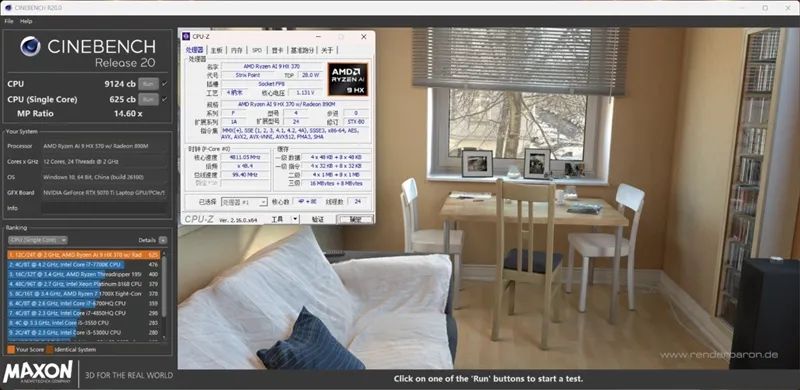
In the CineBench R20 test, the multi-core score was 9124cb and the single-core score was 625cb.
3. CineBench R23
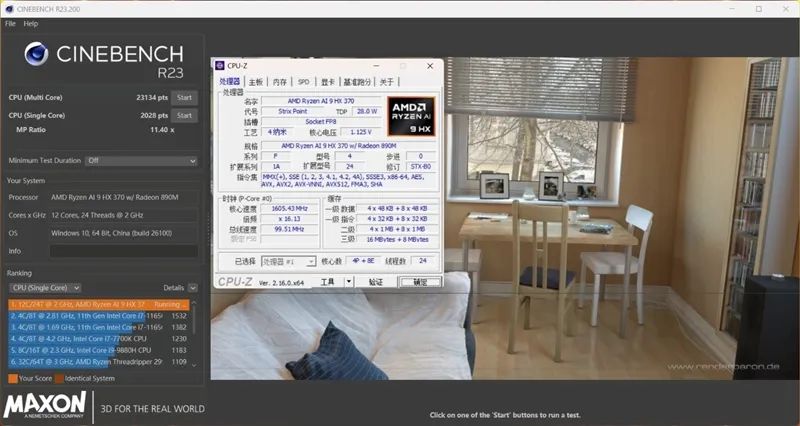
In the CineBench R23 test, the multi-core score was 23134pts and the single-core score was 2028pts.
4. CineBench 2024
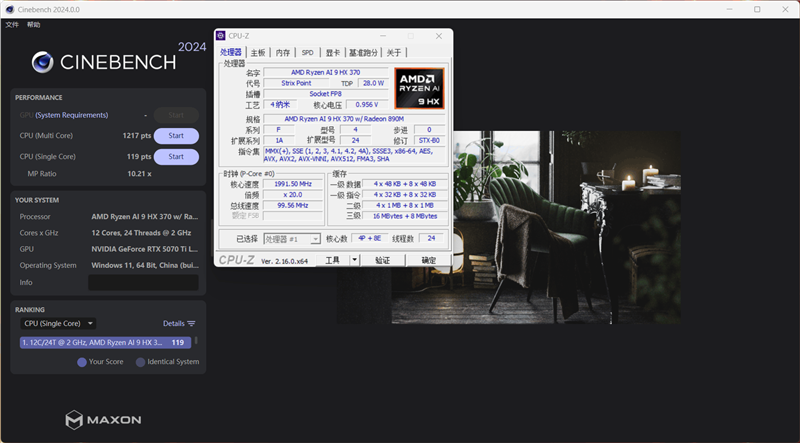
In the CineBench 2024 test, the multi-core score was 1217pts and the single-core score was 119pts.
5. POV-Ray
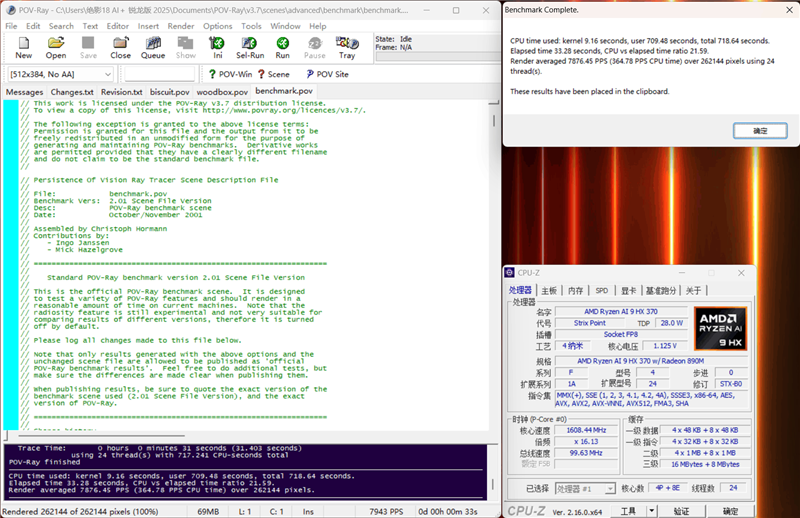
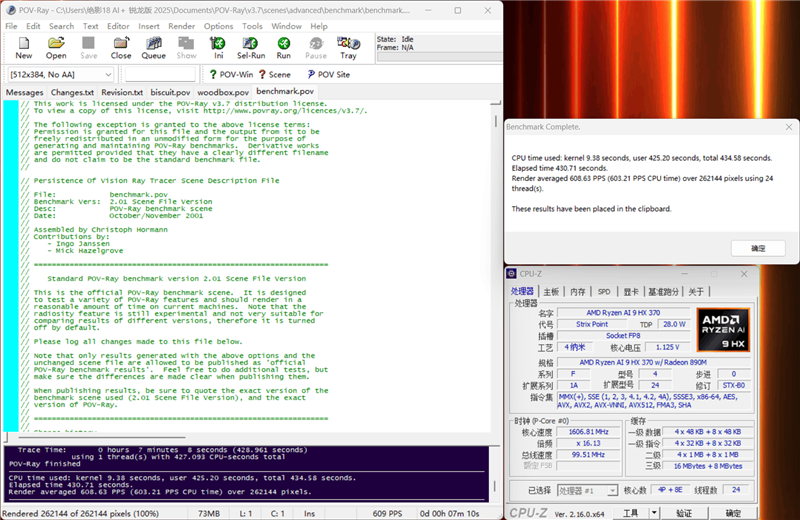
In the POV-Ray test, the multi-threaded score was 7876.45pps, and the single-core score was 608.63pps.
6. Chess Benchmark
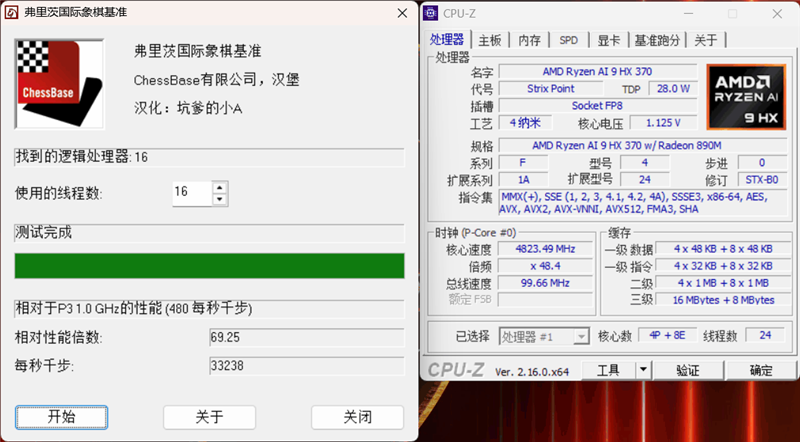
In the Chess Benchmark, the score was 33238 thousand moves per second.
7. Hardware Dog
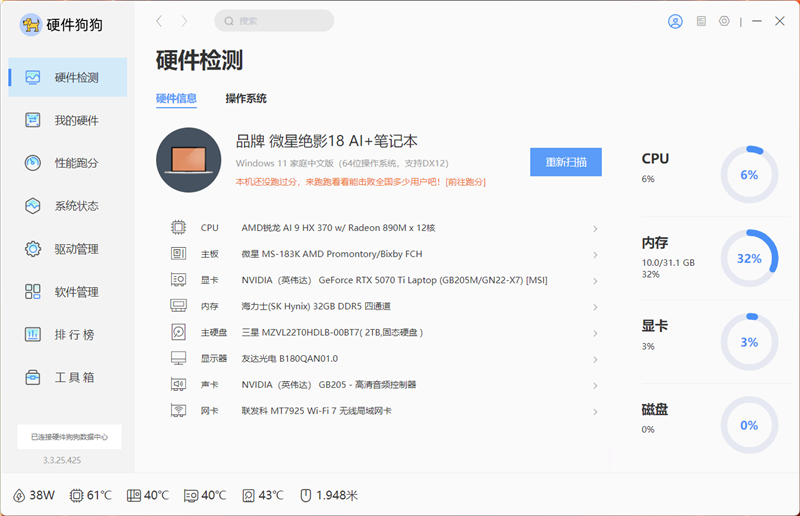

In the Hardware Dog performance benchmark, the MSI Vector GP78 AI+Ryzen Edition 2025 laptop scored 635807 points for core hardware performance, with 245018 points for the CPU and 278605 points for the GPU.
VI. AI and Productivity Performance Tests: Significant Improvement in Video Editing Performance
1. Procyon: Text Reasoning Performance
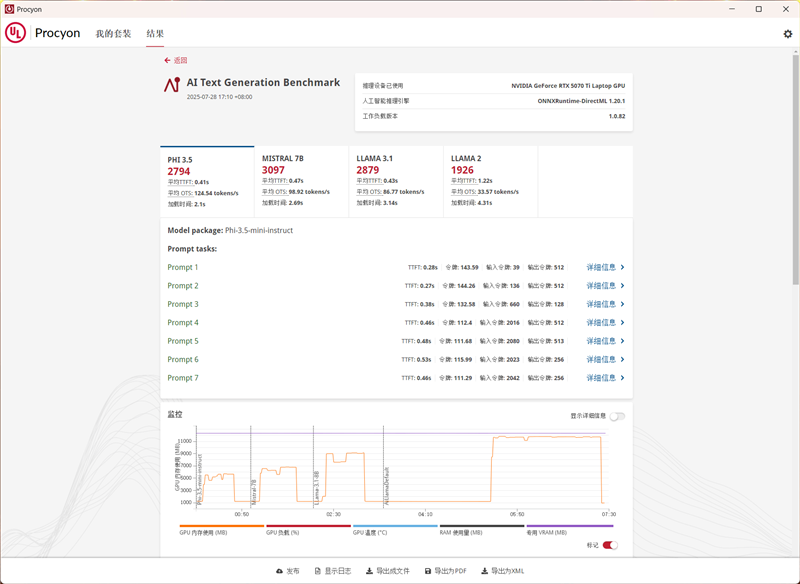
The AI Text Generation Benchmark in Procyon is a simplified local LLM AI performance test that provides easy and fast testing of four industry-standard AI models with different parameter sizes: PHI 3.5, MISREAL 7B, LLAMA 3.1, and LLAMA 2.
The MSI Vector GP78 AI+Ryzen Edition 2025 laptop scored 2794, 3097, 2879, and 1926 respectively for the four models in the test.
2. Procyon: Video Editing Performance Test
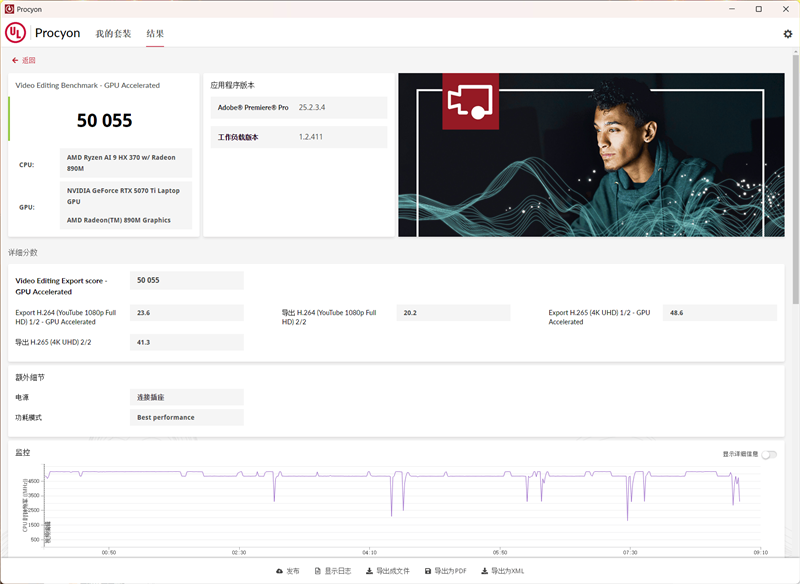
Using the video editing performance test in the Procyon testing tool, Adobe Premiere Pro fully utilized the hardware codec performance of the RTX 5070 Ti Laptop GPU with hardware acceleration enabled. The final test score for the MSI Vector GP78 AI+Ryzen Edition 2025 laptop was 50055.
3. Procyon: AI Image Generation Benchmark - SDXL (FP16)
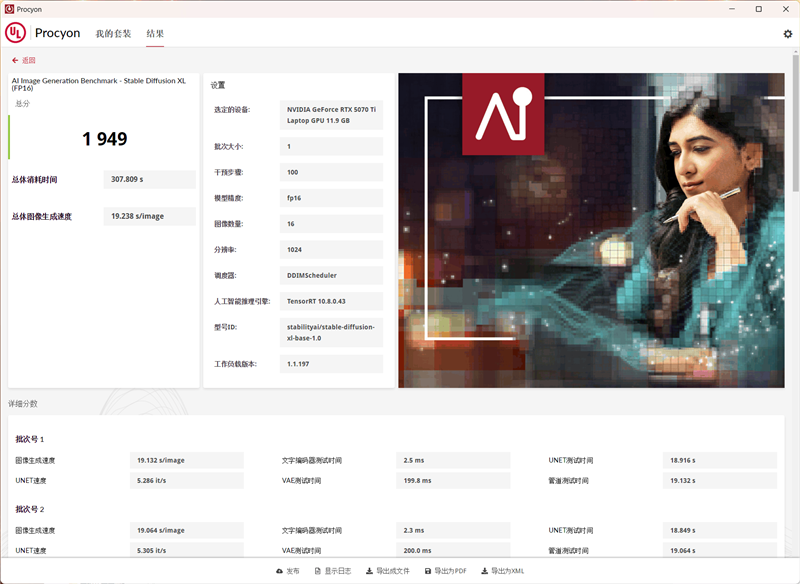
The AI Image Generation Benchmark based on SDXL (FP16) generates one image per batch, creating a total of 16 images with a resolution increased to 1024×1024 and 100 intervention steps.
The GPU score for the MSI Vector GP78 AI+Ryzen Edition 2025 laptop was 1949, with the UNET (neural network architecture) of Stable Diffusion 1.5 reaching a maximum speed of 5.3 it/s, averaging only 19.238 seconds to generate one image.
4. PCMark10
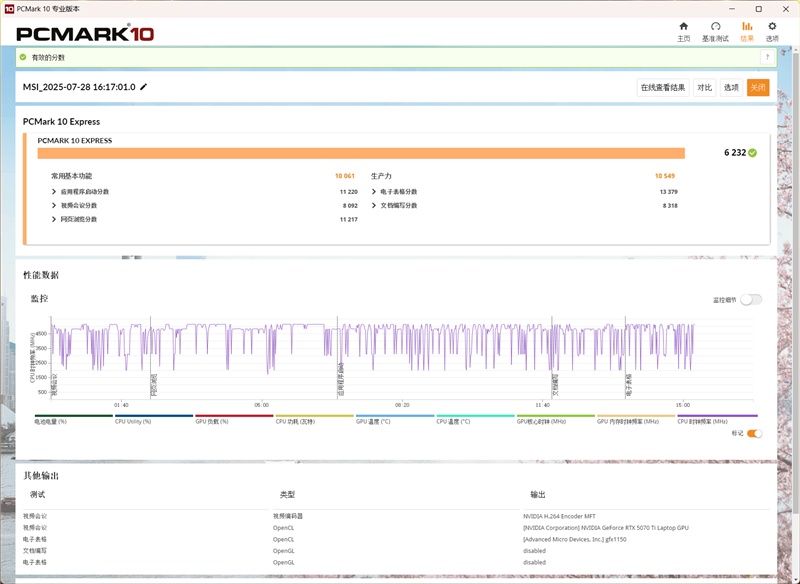
In the PCMark10 Express test, the MSI Vector GP78 AI+Ryzen Edition 2025 laptop scored 6222, with a score of 10061 for the Essentials test and 10549 for the Productivity test.
VII. Memory, Hard Drive, and Display Tests: Excellent Screen Quality, Memory, and Hard Drive One-Stop Solution, No Need for Upgrades
1. Memory Performance Test
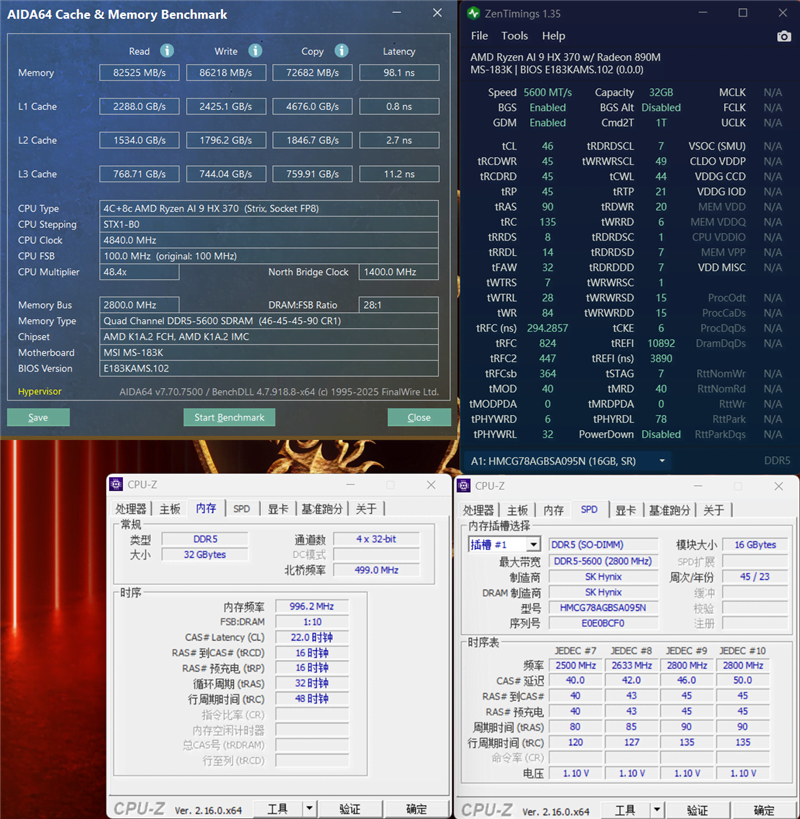
In the AIDA64 memory test, the read, write, and copy bandwidths of the MSI Vector GP78 AI+Ryzen Edition 2025 laptop's memory were 82525MB/s, 86218MB/s, and 72682MB/s, respectively, with a latency of 98.1ns.
2. SSD Performance Test
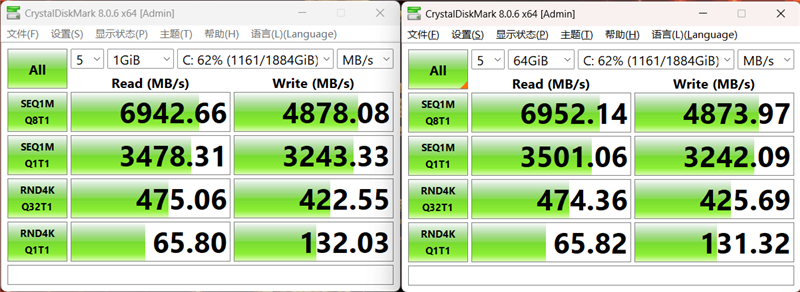
The Samsung PM9A1a SSD built into the MSI Vector GP78 AI+Ryzen Edition 2025 laptop has measured sustained read and write speeds exceeding 6900MB/s and 4800MB/s, respectively, with 4K random read and write speeds of 65MB/s and 130MB/s.
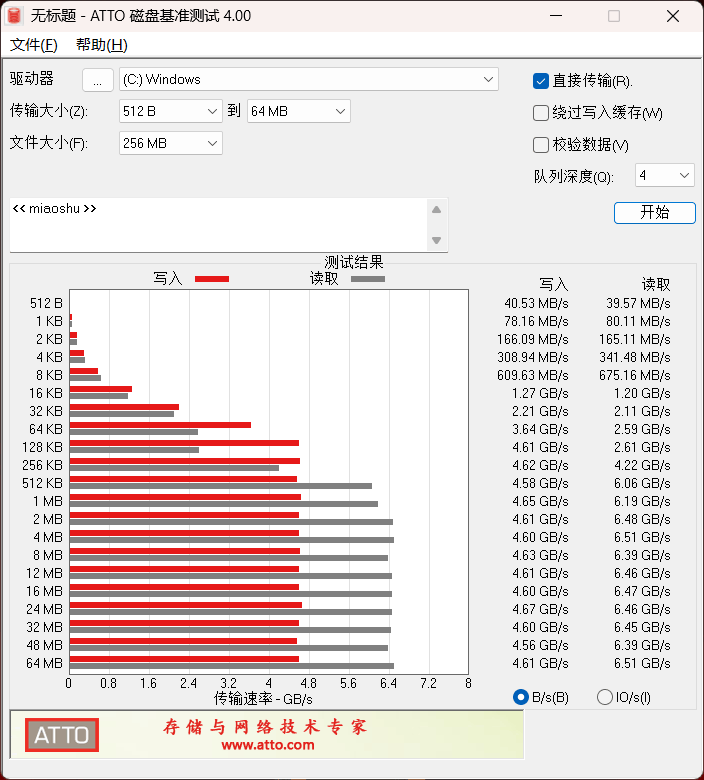
In the ATTO test, the Samsung PM9A1a SSD built into the MSI Vector GP78 AI+Ryzen Edition 2025 laptop had a read and write speed of around 40MB/s in the 0.5K small file test, exceeding 1GB/s for both read and write speeds at 16K, and exceeding 4GB/s for both read and write speeds starting from 256K, basically reaching the maximum speed.
3. Display Test
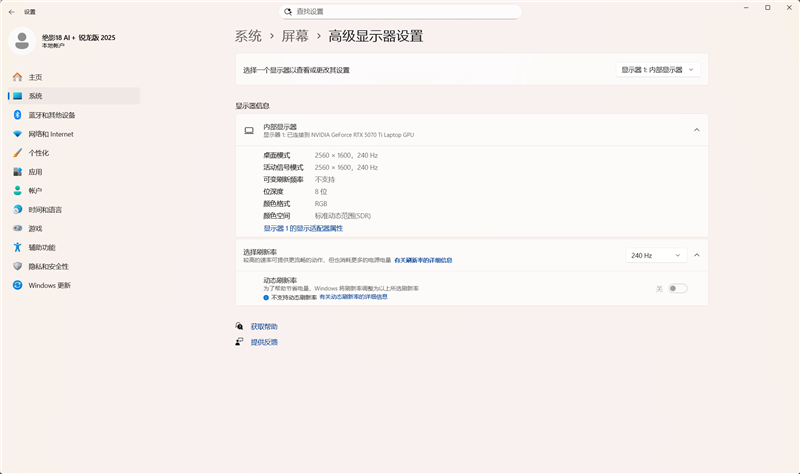
In the Windows Settings menu, the 18-inch Jade Moon display on the MSI Vector GP78 AI+Ryzen Edition 2025 laptop can directly enable a high refresh rate of 240Hz.
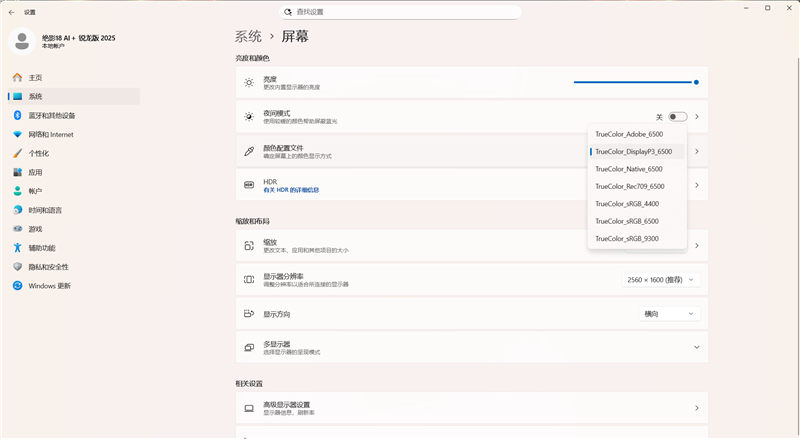
It also comes with multiple preset color profiles.
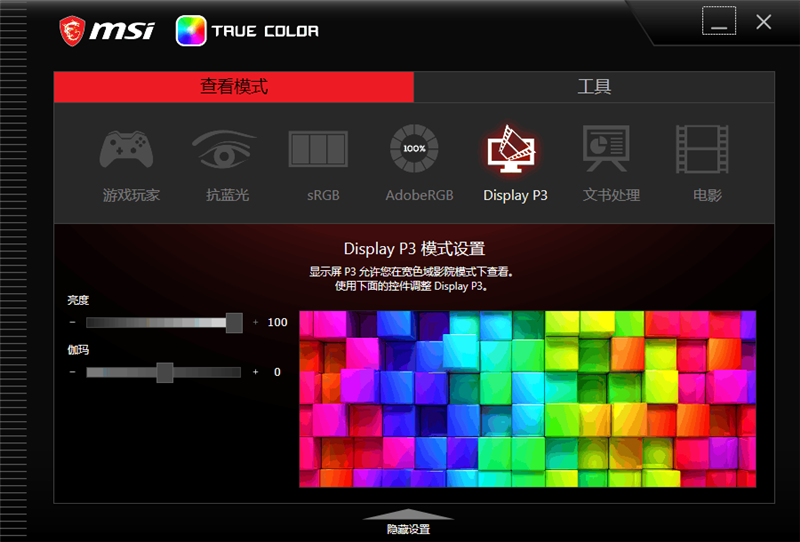
Even more conveniently, the screen's color configuration can be changed directly in the MSI TrueColor software, just like using MSI's professional monitors.
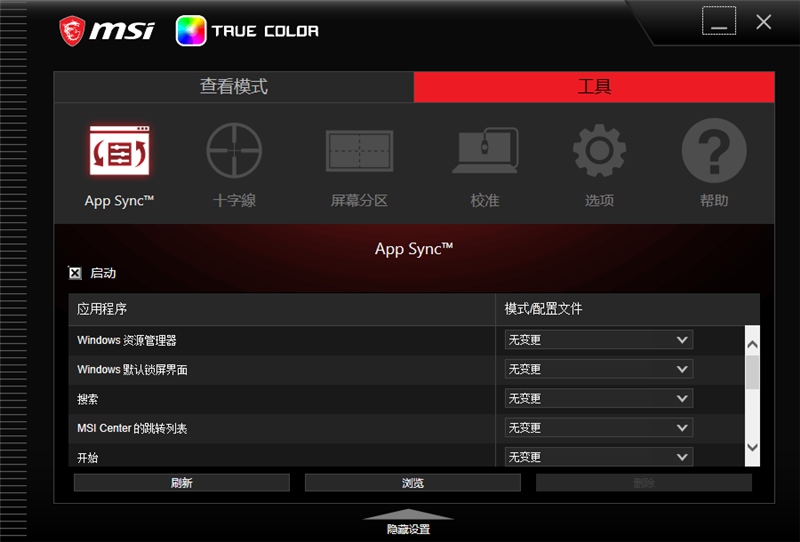
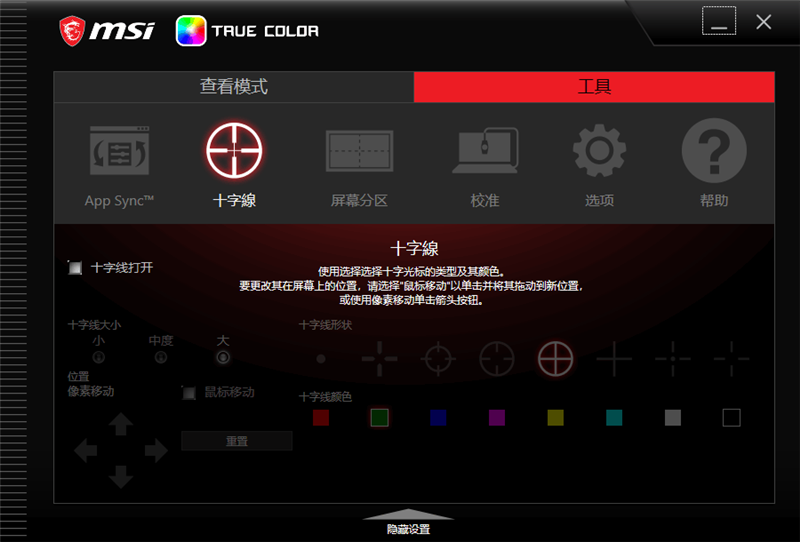
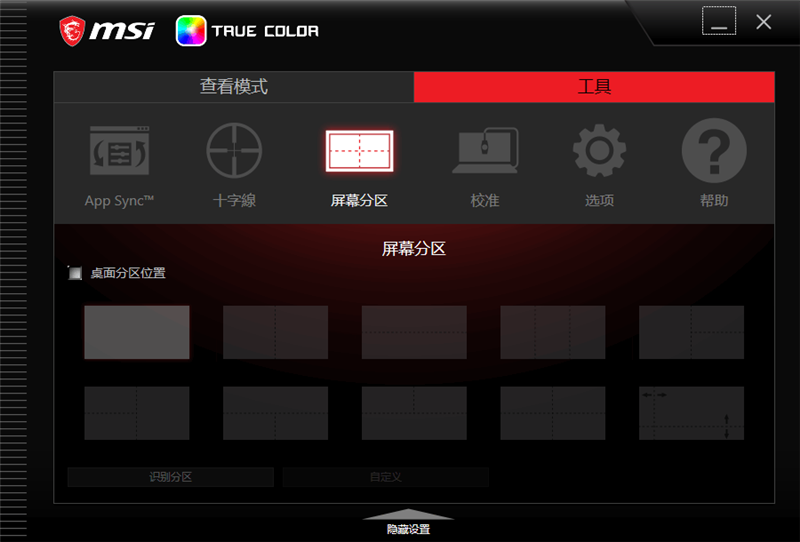
The MSI TrueColor software also provides features commonly used in gaming monitors, such as smart crosshairs.
adv


